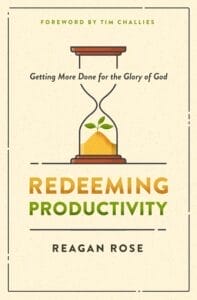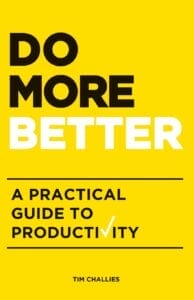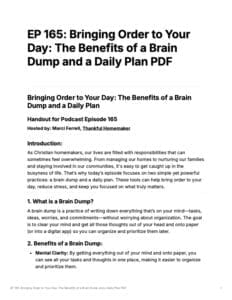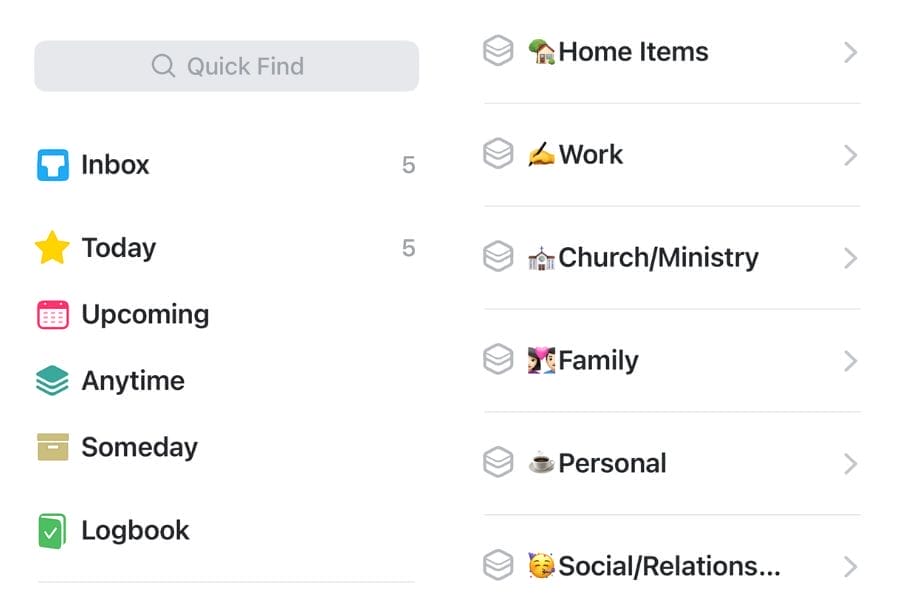EP 165: Bringing Order to Your Day: The Benefits of a Brain Dump and a Daily Plan for Homemakers
Inside: Discover how a brain dump and a daily plan can bring order to your day as a Christian homemaker. Learn practical tips to manage your time and focus on what truly matters—serving the Lord and your family.

As we shift from the busy days of summer to the cozier pace of fall, I find this is the perfect time to take a step back and reassess our routines. While I do love the fresh start of a new year, there’s something about the crisp air and return to regular rhythms in the fall that makes it the ideal season to reorganize and review my projects. It’s a time that naturally invites us to realign our focus and get back on track.
As Christian homemakers, wives, mothers, and grandmothers, our days are filled with countless responsibilities. From managing our homes and nurturing our families to staying involved in our communities and churches, we juggle many tasks that can often leave us feeling overwhelmed. It’s in these moments that I find the practice of a brain dump to be incredibly helpful. This simple exercise can bring clarity, reduce stress, and help us stay focused on what truly matters.
But before we dive into the details, I want to share an encouraging thought that has been a huge comfort to me, especially when I feel the weight of trying to do it all. It comes from Kelly Kapic’s book You’re Only Human. Kapic reminds us that we are created as finite beings with limits, and these limits are not flaws—they’re part of God’s design. As homemakers, we often feel the pressure to do it all, but it’s important to remember that our limitations are not a sign of failure. They’re actually a reminder that we are dependent creatures, designed to rely on God and others.
Listen to EP 165: Bringing Order to Your Day: The Benefits of a Brain Dump and a Daily Plan:
Listen to the podcast (50 minutes) or read a portion of it in the post below (13 minutes)
Recommended Resources:
You’re Only Human: How Your Limits Reflect God’s Design and Why That’s Good News by Kelly M. Kapic

Redeeming Productivity: Getting More Done for the Glory of God by Reagan Rose

Do More Better: A Practical Guide to Productivity by Tim Challies

PDF Download for this Episode (Access in the free library)

Things 3
Google Calendar
ToDoist
Remarkable Tablet
Create a Christ-Honoring Weekly Review @Redeeming Productivity (Video)
Our Goal Isn’t Perfection:
As believers, our true citizenship is in heaven, and from there, we eagerly await our Savior, the Lord Jesus Christ (Philippians 3:20). This heavenly perspective should shape how we approach our daily lives, reminding us that while we strive to be productive and organized, our ultimate reliance isn’t on our systems but on the grace of Jesus Christ.
Our goal isn’t to reach perfection in our productivity but to be faithful stewards of the time, talents, and tasks the Lord has entrusted to us. This is especially true for us as Christian homemakers. Our work is often unseen, repetitive, and can feel never-ending. Yet, it’s in these very tasks—whether it’s folding laundry, preparing meals, or nurturing little hearts—that we serve the Lord and our families.
As we work hard and strive to stay organized, it’s crucial to remember that our ultimate reliance isn’t on our systems but on the grace of Jesus Christ. He is our strength and help in every aspect of our lives, including how we manage our time and tasks each day.
Dependence on God:
In his book, Kapic also points out that our dependence on God and others isn’t a weakness—it’s part of how we were created to live. In a world that often values self-sufficiency, it’s a relief to know that we don’t have to carry every burden alone. We are meant to live in community, to lean on our families, friends, and most importantly, on God. For us homemakers, this might look like asking for help when we need it or taking time to rest without guilt, trusting that God is in control.
So, as you implement your brain dump and organize your tasks, do so with the understanding that while these tools are helpful, they are not the source of our peace or worth. Our true rest comes from Christ, and our aim in all things should be to glorify God, even in the seemingly mundane tasks of our daily lives. Whether we’re folding laundry or planning meals, let’s do it all for the glory of God, knowing that our efforts, though imperfect, are made perfect in Him.
Why a Brain Dump Can Be a Helpful Tool For Homemakers:
A brain dump is more than just a productivity tool—it’s a way to clear mental clutter so that we can focus on what’s most important. It allows us to offload everything that’s swirling in our minds, making space for clearer thinking and more intentional living.
As Christian homemakers, our days are often filled with tasks that can seem mundane, but when we approach them with a clear mind and a heart focused on serving the Lord, even the most routine tasks can become acts of worship.
A brain dump helps us to see the bigger picture, prioritize our tasks, and approach our responsibilities with a sense of peace rather than overwhelm. It’s a simple practice that can make a significant difference in how we manage our time and resources.
When to Use a Brain Dump:
Let’s explore some specific times when a brain dump can be particularly beneficial:
- When Feeling Overwhelmed:
- During certain seasons of life, the demands on our time and energy can seem overwhelming. Whether it’s the start of a new school year, the holidays, or a particularly busy week, these are the moments when a brain dump can be a lifesaver. By getting everything out of your head and onto paper, you can see your tasks more clearly, making it easier to prioritize what needs to be done and bringing a sense of calm to your day.
- When You’re Transitioning Between Seasons:
- Seasonal transitions are natural times to reassess and reorganize. Whether you’re moving from summer to fall, starting a new job, or adjusting to a new routine, a brain dump helps you get a handle on your changing responsibilities. This practice allows you to adjust your focus and make sure your priorities are in line with the season ahead.
- When You’re Starting a New Project:
- If you’re about to embark on a new project, such as planning a family vacation, starting a home renovation, or preparing for a big event, a brain dump can help you capture all the ideas, tasks, and details that need to be considered. This initial, unfiltered flow of information can then be sorted and organized into actionable steps, making the project feel more manageable and less overwhelming.
- When You’re Stuck or Unmotivated:
- We all have those days when motivation is low, and we’re not sure what to do next. A brain dump can help clear the mental fog by allowing you to see everything that’s on your mind. Often, this process reveals underlying concerns or tasks that are weighing you down, helping you to identify what’s really important and reignite your focus.
- When You’re Planning Your Week:
- Incorporating a weekly brain dump into your routine can help you approach your planning with a clear perspective. Before you start scheduling your week, take a few moments to jot down everything that’s on your mind—what you need to do, what you want to do, and even what’s weighing on you. This simple practice brings clarity and ensures that nothing important slips through the cracks.
- When You’re Feeling Disconnected from Your Goals:
- Life can get busy, and it’s easy to lose sight of our larger goals and priorities. A brain dump allows you to reconnect with these by giving you space to reflect on what’s truly important. As you write down your thoughts and tasks, you can realign your daily activities with your long-term goals, ensuring that your efforts are focused on what matters most.
The Benefits of a Brain Dump
Taking the time to do a brain dump offers several key benefits:
- Mental Clarity: Writing down everything on your mind helps you see all your tasks and thoughts in one place, bringing a sense of order to your day.
- Stress Reduction: Offloading your mental load onto paper can significantly reduce stress and anxiety. You no longer have to keep track of everything in your head, which frees you from the pressure of remembering every detail.
- Improved Focus: With a clear mind, you can better focus on the task at hand, improving your productivity and efficiency.
- Enhanced Creativity: When your mind isn’t cluttered with unfinished tasks and worries, there’s more room for creative ideas and solutions to emerge. You might find yourself inspired in ways you hadn’t anticipated.
How to Do a Brain Dump
If you’ve never done a brain dump before, here’s a simple guide to help you get started:
- Set Aside Time: Choose a quiet time when you can sit down without distractions. This could be early in the morning, during a quiet afternoon, or before bed. The goal is to find a time when you can focus and really let your thoughts flow.
- Write Everything Down: Grab a notebook or open a digital document and start writing or typing. Don’t worry about organizing or categorizing at this stage—just get everything out. Whether it’s tasks, worries, ideas, or prayer requests, write it all down. Keep it in a place where it’s easy to access as ideas come into your mind.
- Review and Reflect: Once you’ve written everything down, take a moment to review your list. This can be a time of prayer and reflection, asking God for guidance in managing your tasks and priorities. It’s an opportunity to align your plans with His will and seek His peace in the midst of your responsibilities.
Organizing Your Brain Dump: Choosing Your Tools and Setting Up Your System
Now that you’ve completed your brain dump and have all your tasks, ideas, and commitments laid out in front of you, it’s time to bring some order to the chaos. Whether you prefer the tactile satisfaction of pen and paper or the convenience of a digital system like Google Calendar and Things 3, here’s how to take those scattered thoughts and turn them into a manageable plan.
Using a Calendar and Notebook or Planner
- Prioritize Your Tasks: Look over your list and figure out which tasks are most urgent or important. Highlight or mark these as top priorities.
- Schedule Your Tasks: Assign your top priority tasks to specific days in your weekly planner. Be realistic about what you can accomplish each day—spread out your workload to avoid overwhelm. Make sure you’ve already noted any calendar appointments or events in your planner.
- Review and Adjust: Keep your planner handy throughout the week. When new tasks or ideas pop up, jot them down where they belong. If something doesn’t get done as planned, just move it to another day.
Things 3 Example Set-Up:

Using Google Calendar and Things 3
- Set Up Categories in Things 3: Divide your tasks into broad areas of responsibility, such as Home, Personal, Family, Church/Ministry, Work, Blog, and Current Projects.
- Capture and Organize Tasks: Use the Things 3 app’s Inbox to capture every idea, reminder, or to-do. Then, sort these tasks into their appropriate categories and schedule them for the week.
- Use Google Calendar for Time-Sensitive Events: Add meetings, appointments, and other time-specific events to your Google Calendar. Use reminders to ensure you don’t miss anything important.
- Daily and Weekly Planning: Review your tasks and calendar each morning, making adjustments as needed. Use the repeat task feature for daily or weekly routines to keep them in your rotation without re-entering them constantly.
- Accessible Across Devices: The beauty of digital tools like Google Calendar and Things 3 is their accessibility across all your devices. Whether on your phone, tablet, or computer, you can check your tasks and calendar, make updates, or add new items on the go. This keeps everything synced and ensures you never miss a beat, no matter where you are.
Weekly Review: Google Calendar and Things 3
Now, let’s dive into the weekly review process, which is essential whether you’re using digital tools or prefer pen and paper. I’m going to focus on using Google Calendar and Things 3, but if you’re more comfortable with a traditional planner, you can absolutely adapt these steps to fit your system.
I used only pen and paper for years before transitioning to digital, and the principles remain the same. In fact, I still use a paper planner—I update it during my weekly review time. I appreciate the digital tools for capturing and organizing my days and weeks.
- Set Aside Time: Set aside a specific time each week for your review and planning session—just a few minutes is all it takes. I typically do my weekly review on Sunday afternoon or early evening, but I’ve been trying out Friday afternoons lately to start the weekend with a clear mind.
- Review Your Google Calendar: Start by checking your Google Calendar. Review all the events, appointments, and meetings scheduled for the upcoming week. As you look over your calendar, note any tasks that need to be handled before these events—like baking a dessert for a church meeting or remembering to reschedule a doctor’s appointment. Add these tasks to your task list in Things 3 or your planner.
- Review and Organize Tasks in Things 3: Next, go through the tasks in your Things 3 app (or your planner/notebook if you’re using pen and paper), starting with the Inbox. Move tasks to their appropriate categories—whether that’s Home, Personal, Family, or another area—and schedule them for the week. Check off any tasks you completed last week, and reschedule anything that didn’t get finished. For routine tasks like your morning routine, exercise, or weekly cleaning, use the repeat feature in Things 3 to keep them on your radar.
- Prioritize Your Week: Use Things 3’s “Today” and “Upcoming” views to map out your week. Drag and drop tasks into the days you plan to tackle them. Make sure you’re prioritizing your most important tasks and projects, so they don’t get lost in the shuffle.
- Reflect and Pray: Take a few moments to reflect on the past week. Think about what went well and what could have gone better. Then, bring your plans before the Lord in prayer, asking for His guidance and strength as you head into the new week.
Bringing It All Together
As we wrap up today’s discussion, I want to encourage you to take some time to implement these practices in your daily and weekly routines. Whether you prefer the tactile feel of pen and paper or the convenience of digital tools like Google Calendar and Things 3, the key is finding a system that works for you. The goal isn’t just to manage your time more effectively but to clear the mental clutter so you can focus on what truly matters—serving the Lord and your family with a heart that is calm, clear, and purposeful.
Remember, it’s not about achieving perfection—none of us can do that. It’s about being faithful stewards of the time, talents, and responsibilities that the Lord has entrusted to us. As you plan your days and organize your tasks, keep in mind that you’re not doing this alone. Jesus Christ is your strength, your guide, and your source of peace. Lean on Him, and rest in the assurance that He who began a good work in you will carry it on to completion until the day of Christ Jesus (Philippians 1:6).
So, as you go about your daily tasks, do so with a heart full of grace and trust, knowing that the Lord is with you every step of the way.

